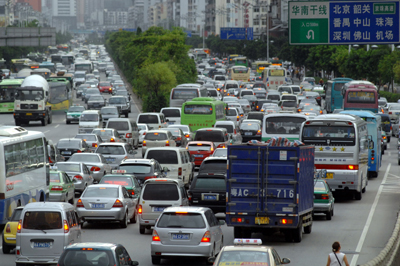Guangzhou's Traffic Cure: Limit Vehicle Usage not Amount

Last year on December 23 Beijing announced its new policy aimed at curbing traffic congestion including measures such as not allowing vehicles without Beijing license plates into the city, limiting the number of new license plates issued per year, and increasing parking fees. Guangzhou is currently dealing with heavy traffic as well, but it remains to be seen whether or not they will follow in Beijing's footsteps.
Guangzhou's Municipal Transport Commission Director, Xian Weixiong has stated that the purchase of vehicles by the public is linked to the progress of society. Therefore some possible measures Guangzhou may take to tackle traffic include lifting parking fees and renovating crowded roads, but will probably not include limiting the number of licenses issued for new vehicles like Beijing.
Measures to ease traffic need to be taken soon because the traffic situation in Guangzhou is out of control. Over the holidays, due to intense traffic, one man's cab ride that normally costs 10 yuan was 45 yuan and one cab driver with a full cab could only stare out as he drove by the lines of people on the side of the road attempting to hail cabs.
Guangzhou Traffic Committee Deputy Director, Huang Shaoxin stated that if measures are not adopted, according to current trends, the average vehicle speed for cars on the road during evening peak traffic will be 17.8 kilometers per hour in 2013; a speed 16.4 percent slower than the average road speed of traffic for Guangzhou during the Asian Games.
The Guangzhou Police Traffic Department recently released data that shows there are 2.145 million vehicles (1.61 million of which are cars) in Guangzhou and 2.703 million drivers. The data also shows that approximately 1200 new license plates were handed out daily in 2010. Although Guangzhou is constructing new roads, their construction speed is not enough to keep up with the speed of vehicle increase.
Although the Deputy Mayor of Guangzhou, Gan Xinzeng stated, "after the Asian Games we will no longer put restrictions on cars," media outlets and residents believe that the lack of restrictions are only temporary and new restrictions are on the way.
A Guangdong Province government advisor, Wang Zechu in a commentary piece recently stated, "Just as Guangzhou cannot restrict the entrance of non-city license plate vehicles like Beijing, adopting measures to limit the number of vehicles sold is even more unimportant."
Many experts agree that Guangzhou needs to focus more on policies aimed at keeping residential vehicles outside of the center of the city which may require adopting a congestion charge like some international cities or charging high parking fees for drivers who insist on driving into the city center. Residents need to see parking their vehicle at a subway station outside of the city and then riding a train into town as an advantage, rather than an inconvenience.
Others complain that it is not the city residents who should be targeted, but the high numbers of governmental cars, cars belonging to public servants, that roam the city every day. It is understood that there are around 200 thousand governmental cars in Guangzhou, a number that according to experts does not have a large impact traffic conditions.
Despite this claims by experts, the voices of citizens critical of the abundance of governmental cars continue to grow louder. A member of the Guangzhou CPPCC Committee, Han Zhipeng recently published a commentary in which he stated, "Governmental vehicles must take the lead to appease the traffic situation in Guangzhou." Regardless of who is at the end of the policy stick first, things need to change in Guangzhou before the city itself turns into a giant parking lot.
Links and Sources
The Economic Observer: 广州治堵:限用不限量
The views posted here belong to the commentor, and are not representative of the Economic Observer |
Related Stories
- EO Exclusive: Beijing May Limit New License Plates to 150,000 Per Year
- Issue Wrap No. 499, Dec 20, 2010
- Views from the East: Chinese Commentators on the Interest Rate Hike
- "Fearless Grandpa" Exposes Cover-up of Subway Safety Flaws
- IMF Senior Resident Representative in China: Effort is Needed by All Sides to Correct the Global Imbalance
Popular

- Economic Observer's 2010 Year End Special
- The top stories of 2010 displayed through slideshows, timelines, buzz words, maps, graphs,...
Interactive
Multimedia

- EEO.COM.CN The Economic Observer Online
- Bldg 7A, Xinghua Dongli, Dongcheng District
- Beijing 100013
- Phone: +86 (10) 6420 9024
- Copyright The Economic Observer Online 2001-2011
















